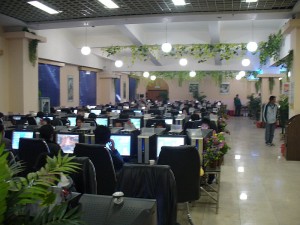
Because of marathon gaming sessions at Internet cafes in China, the gov’t banned all teens from the establishments. Image by Matthew Lyons/Game Gavel https://gamegavel.com.
Some parents in China became alarmed in recent years by their children overindulging in web-related activities, particularly marathon gaming sessions. That led to a market arising in Internet-addiction boot camps, and as often is the case, the cure was worse than the “disease.” Electroshock therapy was just the beginning of the madness. An excerpt from Christopher S. Stewart’s article on the topic in Wired:
“One of the first signs that things had gotten out of hand in China’s Internet-addiction camps was the emergence of Uncle Yang — Yang Yongxin — a psychiatrist who opened a treatment center at a state-owned hospital in eastern Shandong Province in 2006. His camp was one of hundreds that had sprung up in China — many of them unregulated, uncredentialed, and relying on a grab bag of treatments: antidepressants, counseling, even intense physical exertion. (One sent its young clients on a 528-mile trek through Inner Mongolia.) What began as a fairly well-regarded and disciplined approach had spun into a growth industry, packed with untrained entrepreneurs.
Yang’s battery of therapies included electroshock — known as xing nao, or ‘brain waking.’ Electrodes were attached to his patients’ hands and temples, then shot through with 1 to 5 milliamps of electricity. One girl recalled wearing a mouth guard to prevent her from biting off her tongue. Some sessions apparently went on for a half hour; occasionally, a shock was said to leave burns. In an interview with a local paper, Yang defended the practice, saying, ‘It doesn’t cause any damage to the brain. But it is painful, quite painful!’
Yang was not a psychotherapist, nor was he licensed to administer electroshock. But that didn’t matter. He claimed to know what he was doing. ‘It will clear the mind,’ he promised. He charged almost $900 per month — a remarkable sum for a country in which the average monthly wage is around $400. Still, some 3,000 desperate parents sent their kids to him for four-month stints. The media hailed Yang as a ;national Web-addiction expert,’ recounting his heroic tales of life at his rehab center. Even after Yang’s methods were deemed excessive — in July, Chinese authorities banned electroshock as an Internet-addiction treatment, claiming the tactic required further study — his services were reportedly still in demand.”


